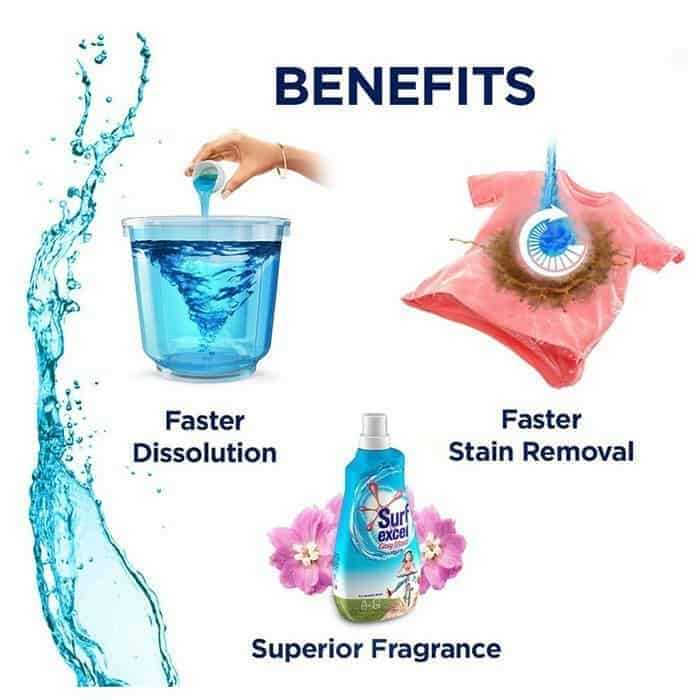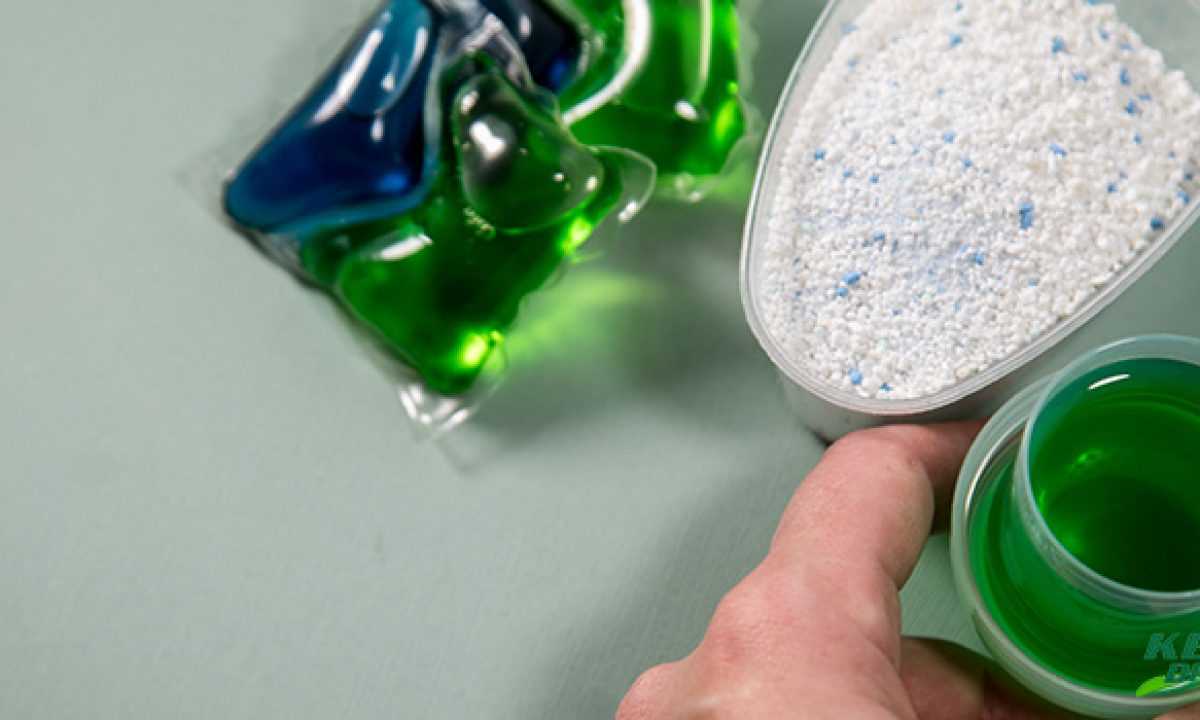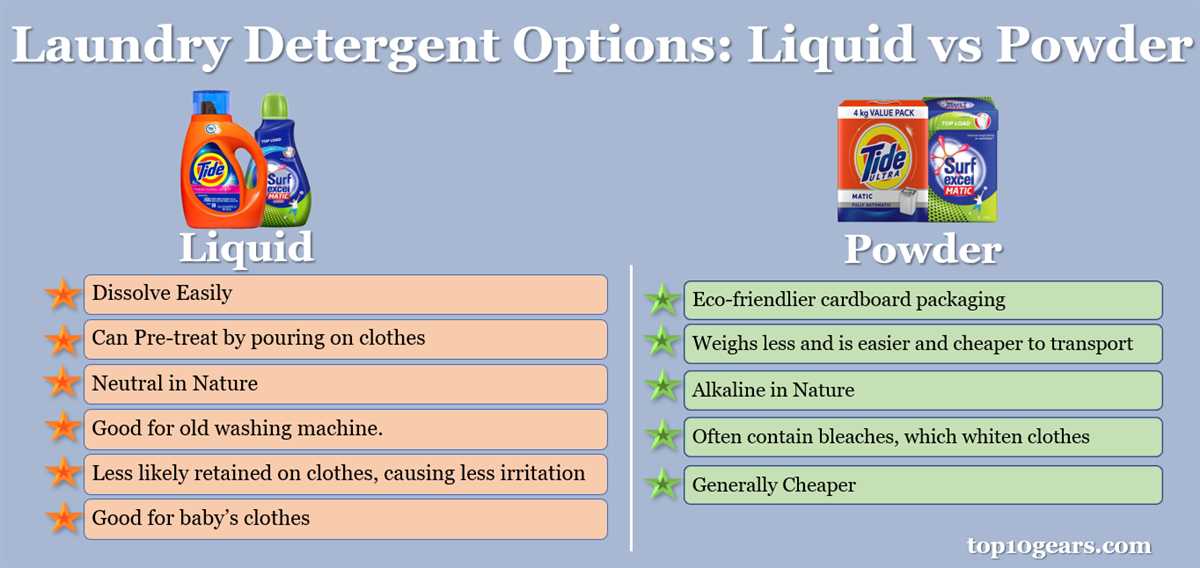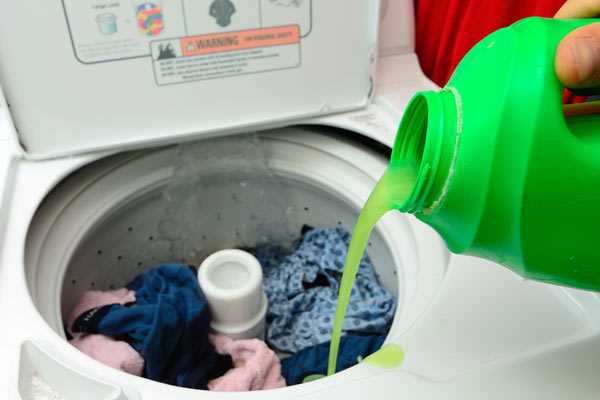




When it comes to choosing the best detergent for your washing machine, you may find yourself debating between liquid and powder options. Both types have their benefits and drawbacks, so it’s important to consider your specific needs and preferences before making a decision.
One advantage of liquid detergent is its ease of use. It dissolves quickly and fully in water, ensuring that your clothes get a thorough and even clean. Liquid detergent is also great for pre-treating stains, as you can directly apply it to the affected area. Additionally, liquid detergent is known to be gentler on fabrics, making it a suitable choice for delicate items.
On the other hand, powder detergent is known for its powerful cleaning capabilities. It contains enzymes that help break down tough stains and remove dirt and oils from fabric. Powder detergent is also a cost-effective option, as it tends to be cheaper than liquid detergent and lasts longer. However, it may not dissolve as easily in water, leaving behind residue on clothes and in the washing machine.
Ultimately, the decision between liquid and powder detergent for your washing machine depends on your personal preferences and needs. If you prioritize convenience and gentle cleaning, liquid detergent may be the best choice for you. However, if you have heavily soiled clothes and are looking for a more powerful clean, powder detergent may be the better option. Whichever you choose, make sure to follow the instructions on the packaging for optimal usage and cleaning results.
Overview of Washing Machine Detergents

Choosing the right detergent for your washing machine is essential for achieving clean and fresh-smelling clothes. There are two main types of detergents commonly used: liquid and powder. Each type has its own advantages and disadvantages, so it’s important to understand the differences between them before making a decision.
Liquid Detergents

Liquid detergents are a popular choice for many households. They are easy to use and can be directly poured into the washing machine without any additional steps. Liquid detergents are also effective at removing stains and dirt, particularly for delicate fabrics. They are also less likely to leave residue on clothes or in the washing machine.
However, liquid detergents can be more expensive than powder detergents, and they often come in plastic bottles, which can contribute to environmental waste. Additionally, liquid detergents may not be as effective at removing tough stains, and they can sometimes cause excess sudsing, which can lead to issues with the washing machine.
Powder Detergents
Powder detergents have been on the market for a long time and are still a popular choice for many consumers. They are generally more affordable than liquid detergents and come in cardboard or paper packaging, making them a more environmentally friendly option.
Powder detergents are known for their strong cleaning power and ability to remove tough stains. They also typically work well in areas with hard water. However, powder detergents may not dissolve completely in cold water, and they can sometimes leave residue on clothes or in the washing machine. They also require additional steps, such as pre-dissolving in water before adding them to the washing machine.
Choosing the Right Detergent
When choosing between liquid and powder detergents, consider factors such as your budget, environmental impact, washing machine type, and the fabric of your clothes. Some washing machines come with specific recommendations for detergent types, so be sure to check the manufacturer’s instructions.
It’s also important to read the labels and instructions on the detergent packaging to ensure you are using the correct amount for your load size and desired cleaning results. Remember, using too much detergent can lead to excess sudsing and potentially damage your washing machine.
| Factor | Liquid Detergent | Powder Detergent |
|---|---|---|
| Convenience | Easily poured into the machine | Requires pre-dissolving in water |
| Cleaning Power | Effective for delicate fabrics, but may not remove tough stains | Strong cleaning power, great for tough stains |
| Packaging | Often comes in plastic bottles | Usually packaged in cardboard or paper |
| Cost | Can be more expensive | Generally more affordable |
| Environmental Impact | Can contribute to plastic waste | More environmentally friendly packaging options |
In conclusion, both liquid and powder detergents have their own advantages and disadvantages. Consider your personal preferences and needs when making a decision, and always follow the instructions on the detergent packaging for best results.
Liquid vs Powder: Pros and Cons
-
Liquid Detergent:
Pros:
- Convenient and easy to use, as it comes in a liquid form that can be poured directly into the washing machine.
- Dissolves quickly in water, ensuring that it evenly penetrates the fabric and effectively cleans the clothes.
- Works well for pre-treating stains, as it can be directly applied to the affected area.
- Usually comes with a measuring cap or dispenser, making it easier to measure the correct amount.
- Less likely to leave residue or clumps of detergent on clothes.
Cons:
- Can be more expensive than powdered detergent.
- May require more product per load, depending on the concentration.
- May contain more chemicals and additives compared to powdered detergent.
- Bottles can be heavy and bulky, making them harder to store and transport.
- May not be suitable for all washing machines, as some machines may require specific types of detergent.
-
Powder Detergent:
Pros:
- Generally more cost-effective and less expensive than liquid detergent.
- Can be easier to store and transport, as it comes in compact and lightweight packaging.
- Tends to have a longer shelf life compared to liquid detergent.
- Can be more effective at removing tough stains, especially those caused by oil or grease.
- Works well in high-temperature wash cycles, as it does not dissolve as quickly as liquid detergent.
Cons:
- Can sometimes leave white residue on clothes, especially if not properly dissolved.
- May not dissolve as easily in cold water, leading to potential residue or clumps of detergent.
- May require additional steps, such as pre-dissolving in water, before adding it to the washing machine.
- Measuring the correct amount can be more challenging and messy compared to liquid detergent.
- May not be suitable for certain types of fabrics or delicate garments, as the powder particles can be abrasive.
Effectiveness and Cleaning Power
When it comes to effectiveness and cleaning power, both liquid and powder detergents have their advantages and disadvantages.
Liquid Detergent
- One of the main benefits of liquid detergent is its ability to dissolve quickly and completely in water.
- This makes it an ideal choice for washing machines with quick wash cycles or for washing clothes in cold water.
- Liquid detergent is also easier to measure and pour, reducing the risk of using too much or too little detergent.
- It is particularly effective at removing greasy or oily stains and can be pre-treated directly onto the fabric before washing.
Powder Detergent

- Powder detergent, on the other hand, tends to be more effective at removing tough stains, especially those caused by dirt or grass.
- It contains enzymes and other active ingredients that are highly effective at breaking down and removing these types of stains.
- Powder detergent is also generally cheaper than liquid detergent, making it a more cost-effective option for larger households or those on a tighter budget.
- However, it can sometimes leave white residue on darker clothes or fabrics if not properly dissolved in the wash cycle.
In conclusion, both liquid and powder detergents have their own advantages and are effective at cleaning clothes in a washing machine. Liquid detergent is better for quick wash cycles and tackling greasy stains, while powder detergent is better for tough stains and offers better value for money. Ultimately, the choice between the two comes down to personal preference and the specific needs of your laundry.
Impact on Washing Machine Performance

Both liquid and powder detergents can have an impact on the performance of washing machines, but the specific effects may vary depending on the type of detergent used.
1. Residue Build-up
One common issue with both liquid and powder detergents is the potential for residue build-up in the washing machine. Over time, detergent residue can accumulate on the drum, pipes, and other components of the machine. This build-up can lead to issues such as reduced water flow, clogged filters, and odour. However, the tendency for residue build-up may differ between liquid and powder detergents.
- Liquid Detergents: Liquid detergents are generally less likely to leave behind residue on the machine as they tend to dissolve more easily. However, if used in excessive amounts, they can still contribute to build-up over time.
- Powder Detergents: Powder detergents may leave behind residue more easily, especially if not properly dissolved or if too much is used. The particles in powder detergents can clump together and accumulate in the machine, leading to potential issues.
2. Detergent Dispensing

The way in which the detergent is dispensed into the washing machine can also affect its performance.
- Liquid Detergents: Liquid detergents are typically easier to pour and measure accurately, making it less likely that you will use too much or too little detergent. They can be poured directly into the machine’s detergent dispenser or into a measuring cup.
- Powder Detergents: Powder detergents can be a bit more challenging to measure. It’s important to follow the manufacturer’s instructions to ensure the correct amount is used. Pouring powder directly into the dispenser or using a measuring scoop can help prevent over- or under-dosing.
3. Staining and Bleaching
Another consideration when choosing between liquid and powder detergents is the potential for staining or bleaching of fabric.
- Liquid Detergents: Liquid detergents are less likely to cause staining or bleaching as they are usually formulated to be gentle on fabrics. This makes them a better choice for delicate or brightly colored clothing.
- Powder Detergents: Powder detergents may contain bleach or other stain-removing agents, which can be effective for removing tough stains. However, these ingredients also increase the risk of fabric damage or color fading, particularly on delicate items.
4. Washing Machine Compatibility
It’s important to consider the compatibility of the detergent with your specific washing machine model.
- Liquid Detergents: Liquid detergents are generally safe to use in all types of washing machines, including high-efficiency (HE) models. They are less likely to cause excessive sudsing, which can damage HE machines.
- Powder Detergents: Powder detergents can work well in traditional top-loading machines. However, in HE machines, they may produce too many suds and cause performance issues. It’s important to check the manufacturer’s recommendations for your specific machine.
Ultimately, the choice between liquid and powder detergents for your washing machine depends on your personal preference, the type of clothing you regularly wash, and the specific requirements of your machine.
Suitability for Different Types of Clothes

When it comes to choosing between liquid and powder detergent, considering the type of clothes you are washing is crucial. Different fabrics and materials have different requirements in terms of cleaning and care. Here is a breakdown of the suitability of each detergent type for various types of clothes:
1. Delicate fabrics:
- Liquid detergent: Liquid detergents are generally gentler on delicate fabrics such as silk, lace, or wool. They are less likely to cause damage or fading.
- Powder detergent: Powder detergents can be too harsh for delicate fabrics and may cause them to lose their softness or become damaged over time. It is advisable to avoid using them on delicate items.
2. Stains and tough dirt:
- Liquid detergent: Liquid detergents are often more effective when it comes to removing tough stains and dirt. Their liquid form allows for better penetration into fabrics, making them a better choice for heavily soiled clothes.
- Powder detergent: Powder detergents may struggle to completely dissolve and remove tough stains. However, they can be effective for regular cleaning or on light stains.
3. Performance fabrics:
- Liquid detergent: Liquid detergents are suitable for performance fabrics like athletic wear, activewear, or swimwear. They can effectively remove sweat, oils, and odors, while keeping the fabric’s performance features intact.
- Powder detergent: Some powder detergents specifically formulated for high-performance fabrics are available on the market. These can be a good choice if you prefer using powder and have performance garments.
4. Whites and bright colors:
- Liquid detergent: Liquid detergents are generally safe for whites and bright colors. They are less likely to leave behind residue or cause color fading.
- Powder detergent: Powder detergents may contain brightening agents that can help maintain the whiteness of garments. However, some powders may leave white residue on dark or colored fabrics if not fully dissolved or rinsed properly.
5. Allergies and sensitivities:
- Liquid detergent: Liquid detergents are often a preferred choice for individuals with allergies or sensitive skin. They usually contain fewer or no fragrance and are less likely to cause skin irritation.
- Powder detergent: Some powder detergents may contain additives or fragrances that can trigger allergies or irritate sensitive skin. If you have such concerns, it is best to opt for a hypoallergenic powder detergent.
Remember, always check the care labels on your clothes for specific instructions. If in doubt, it is recommended to test any new detergent you are trying on a small hidden area of the fabric before washing the entire garment.
Environmental Considerations
- Liquid detergents often come in plastic bottles that are not always recyclable, leading to increased plastic waste.
- Powder detergents usually come in cardboard boxes that are more easily recyclable compared to plastic bottles.
- Both liquid and powder detergents can contain chemicals that can be harmful to the environment. These chemicals may end up in water bodies when washed down the drain.
- Some liquid detergents may contain microplastics, which can contribute to water pollution and harm marine life.
- Powder detergents may produce less carbon emissions during the manufacturing process compared to liquid detergents.
- The production of both liquid and powder detergents requires the use of energy and resources, contributing to their environmental impact.
- Some detergent manufacturers offer eco-friendly options that are free from harmful chemicals and are biodegradable.
When choosing between liquid and powder detergents, it is important to consider the environmental implications and opt for products that have a minimal impact on the environment. Additionally, using the recommended amount of detergent and washing clothes at lower temperatures can further reduce the environmental footprint of laundry.
FAQ
Which is better for washing machines: liquid or powder detergent?
Both liquid and powder detergent can be used in washing machines. The choice depends on personal preference and the type of laundry being washed.
Does liquid detergent clean clothes better than powder detergent?
Both liquid and powder detergent can effectively clean clothes. The cleaning power depends on the formulation and ingredients of the detergent.
Can liquid detergent damage a washing machine?
Liquid detergent is generally safe for washing machines. However, using too much liquid detergent can cause excessive sudsing, leading to poor rinsing and potential damage to the machine.
Do I need to use a specific detergent for a front-loading washing machine?
Front-loading washing machines typically require a low-sudsing detergent. Both liquid and powder detergent that are specifically formulated for front-loading machines can be used.
What are the advantages of using powdered detergent?
Powdered detergent is typically cheaper and can be more effective at removing stains and odours. It also allows for more control over the amount of detergent used.
What is the difference between liquid and powder detergent?
Liquid detergent is in a liquid form, while powder detergent is in a powdered form. They both serve the same purpose of cleaning clothes, but the consistency and composition of the two types differ.











